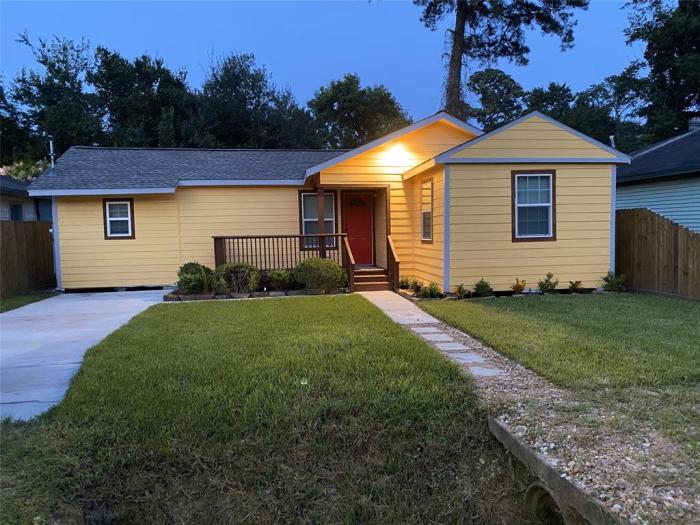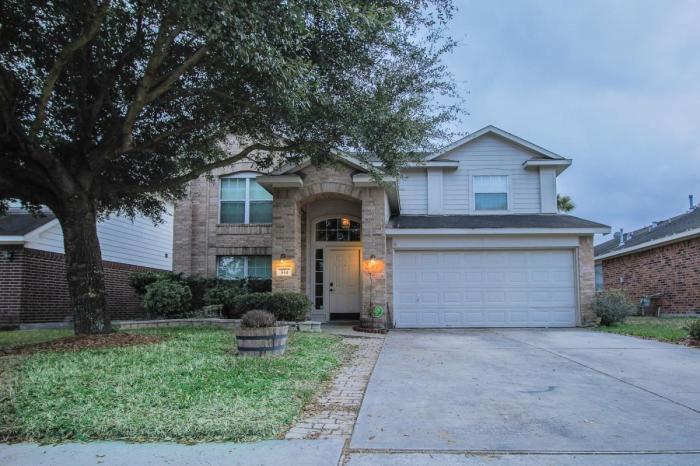How to buy a rental property in Houston? It sounds daunting, but with the right information, it can be a rewarding investment. This guide walks you through everything from understanding the Houston market’s unique nuances and securing financing to finding the perfect property and managing it successfully. We’ll cover crucial aspects like navigating legal requirements, attracting reliable tenants, and even maximizing your tax benefits.
Get ready to unlock the potential of Houston real estate!
Investing in Houston rental properties offers a unique blend of challenges and opportunities. The city’s diverse economy and strong population growth create a consistently high demand for rental units. However, understanding the local market, securing financing, and navigating the legal landscape are key to success. This guide will equip you with the knowledge and strategies needed to confidently navigate the process and make smart investment decisions.
Understanding the Houston Real Estate Market

Source: amazonaws.com
Houston’s real estate market, particularly its rental sector, presents a dynamic landscape for investors. Understanding current trends, neighborhood specifics, and the factors influencing property values is crucial for successful investment. This section provides an overview to help you navigate this market.
Houston Rental Market Overview
The Houston rental market is characterized by high demand and relatively affordable prices compared to other major US cities. Strong population growth, fueled by a robust job market in energy, healthcare, and technology, consistently drives rental demand. However, recent economic shifts have introduced some nuances. While demand remains strong, rising interest rates have slightly tempered the pace of price increases in some sectors, making it a potentially opportune time for strategic investors.
Forecasts suggest continued growth, although perhaps at a more moderate pace than in previous years. This moderation offers a chance to find well-priced properties and potentially secure strong returns over the long term.
Neighborhood Analysis and Rental Potential
Houston boasts a diverse range of neighborhoods, each with its unique rental potential. Areas like the Heights and Montrose, known for their walkability and vibrant culture, command higher rents but also come with higher property prices. Conversely, suburbs like Katy and Sugar Land offer more affordable options, but rental yields might be slightly lower. Inner-city neighborhoods undergoing revitalization can present attractive opportunities for investors willing to take on some risk.
Thorough due diligence, including careful analysis of crime rates, school districts, and proximity to amenities, is essential when selecting a neighborhood. For example, the Memorial area consistently attracts high-income renters due to its excellent schools and upscale amenities, leading to strong rental demand. Conversely, neighborhoods closer to the industrial areas might offer lower rents but could also attract a different demographic of renters, impacting overall yield.
Factors Influencing Property Values
Several factors significantly influence property values across Houston’s diverse neighborhoods. Location is paramount, with proximity to major employment centers, desirable schools, and amenities directly impacting property prices. The condition and size of the property are also key considerations. Newly renovated properties or those with desirable features like updated kitchens and bathrooms tend to command higher rents and values.
Furthermore, the overall economic climate and interest rates play a significant role in shaping market dynamics. For example, a booming energy sector will likely increase demand and prices in neighborhoods close to energy companies. Conversely, rising interest rates can slow down both buying and rental activity.
Rental Yield Comparison by Zip Code
The following table provides a simplified comparison of estimated rental yields across selected Houston zip codes. Remember that these are estimates, and actual yields can vary based on property-specific factors. It’s crucial to conduct thorough research and consult with local real estate professionals for accurate and up-to-date information.
| Zip Code | Average Rent | Average Property Price | Estimated ROI |
|---|---|---|---|
| 77005 | $2500 | $400,000 | 6% |
| 77008 | $2000 | $300,000 | 8% |
| 77024 | $1800 | $250,000 | 7% |
| 77449 | $1500 | $200,000 | 9% |
Financing Your Rental Property Purchase

Source: houstonagentmagazine.com
Buying a rental property in Houston is a significant investment, and securing the right financing is crucial for a successful venture. Understanding your financing options and planning your budget carefully will lay a solid foundation for your real estate journey. This section will Artikel various financing methods and guide you through the budgeting process.
Financing Options for Rental Properties in Houston, How to buy a rental property in houston
Several financing options cater to the specific needs of rental property investors in Houston. These options vary in terms of down payment requirements, interest rates, and eligibility criteria. Choosing the right option depends on your credit score, down payment capacity, and the type of property you’re purchasing.
Conventional Loans
Conventional loans are offered by private lenders, not government-backed entities. They typically require a higher credit score (often above 620) and a larger down payment (usually 20% or more) compared to government-backed loans. However, they often come with lower interest rates and more flexible terms. A strong financial profile is essential for securing a conventional loan. For example, a prospective investor with a 750 credit score and a 25% down payment would likely qualify for a competitive interest rate.
FHA Loans
FHA loans are insured by the Federal Housing Administration, making them more accessible to borrowers with lower credit scores (generally above 500) and smaller down payments (as low as 3.5%). While FHA loans offer easier qualification, they usually come with slightly higher interest rates and mortgage insurance premiums. A first-time homebuyer or investor with a less-than-perfect credit history might find an FHA loan a suitable option.
For instance, an investor with a 600 credit score could potentially leverage an FHA loan to purchase a rental property with a smaller down payment.
VA Loans
VA loans are guaranteed by the Department of Veterans Affairs and are specifically designed for eligible veterans, active-duty military personnel, and surviving spouses. These loans typically require no down payment, making them highly attractive to qualifying individuals. However, the eligibility criteria are strictly defined by the VA. A veteran with a good credit score could leverage a VA loan to purchase a rental property with minimal upfront costs.
The Importance of Pre-Approval
Securing pre-approval before you begin your property search is highly recommended. Pre-approval gives you a clear understanding of how much you can borrow, strengthens your negotiating position with sellers, and allows you to focus your search on properties within your budget. Without pre-approval, you risk falling in love with a property only to discover later that you cannot afford it.
The pre-approval process involves providing financial documentation to a lender, who will then assess your creditworthiness and determine your loan eligibility.
Sample Budget for Purchasing a Rental Property in Houston
This is a sample budget and actual costs will vary depending on the property’s price, location, and condition.
| Expense Category | Estimated Cost |
|---|---|
| Property Purchase Price | $250,000 |
| Down Payment (20%) | $50,000 |
| Closing Costs (2-5% of purchase price) | $5,000 – $12,500 |
| Repairs and Renovations (Estimate) | $10,000 |
| Property Taxes (Annual Estimate) | $4,000 |
| Homeowners Insurance (Annual Estimate) | $1,500 |
| Mortgage Insurance (if applicable) | Variable |
| Vacancy Rate (5-10% of annual rental income) | Variable |
| Property Management Fees (if applicable) | Variable |
Remember, this is just a sample budget. You should consult with a financial advisor and real estate professional to create a personalized budget based on your specific circumstances.
Finding the Right Rental Property: How To Buy A Rental Property In Houston

Source: appfolio.com
Finding the perfect rental property in Houston requires a strategic approach. You need to balance your desired location, property type, and budget against the realities of the Houston real estate market. This involves careful research, effective communication, and a keen eye for detail during property viewings.
Identifying Suitable Rental Properties
Defining your criteria is the first step. Consider your budget, including not just the purchase price but also closing costs, potential renovations, property taxes, and insurance. Think about the type of property—single-family home, condo, townhouse—that best suits your investment strategy and target tenant demographic. Location is key; research areas with high rental demand, good schools (if targeting families), and convenient access to amenities and transportation.
Consider factors like crime rates and proximity to major employment centers. Websites like Zillow, Realtor.com, and HAR.com offer detailed property listings and neighborhood information.
Utilizing Online Portals and Real Estate Agents
Online real estate portals provide a vast database of listings. Start by refining your search using your pre-defined criteria (budget, location, property type). Pay close attention to property details, including square footage, number of bedrooms and bathrooms, year built, and any recent renovations. Many sites offer virtual tours, which can save you time by eliminating properties that don’t meet your initial expectations.
Working with a real estate agent experienced in Houston’s rental market offers significant advantages. A good agent will have access to off-market listings, provide expert negotiation support, and handle the complex paperwork involved in purchasing a property.
Negotiating Purchase Price and Terms
Negotiating the purchase price is a crucial aspect of buying any property. Thorough research is essential; compare similar properties in the area to determine a fair market value. Your agent can help you develop a competitive offer, taking into account the property’s condition and market trends. Beyond price, negotiate terms like closing costs, contingencies (e.g., inspection, appraisal), and financing options.
Remember, a strong offer reflects not only price but also demonstrates your seriousness as a buyer. For example, a larger earnest money deposit can signal your commitment and increase your chances of a successful negotiation. A realistic and well-prepared offer is far more likely to be accepted than an overly aggressive one.
Property Inspection Checklist
Before making an offer, schedule a thorough inspection of the property. Bring a checklist to ensure you cover all essential aspects. This should include:
- Structural Integrity: Check for cracks in walls, foundations, and ceilings. Inspect the roof for damage or leaks.
- Plumbing and Electrical Systems: Test all faucets, toilets, and showers. Check electrical outlets and light fixtures.
- HVAC System: Verify the functionality of the heating and air conditioning systems.
- Appliances: Test all major appliances (oven, refrigerator, dishwasher, washing machine, dryer).
- Exterior: Examine the landscaping, fencing, and any outbuildings.
- Safety Features: Check smoke detectors, carbon monoxide detectors, and security systems.
It’s advisable to hire a professional home inspector to conduct a comprehensive assessment. Their expertise will identify potential issues that might not be apparent to a layperson, potentially saving you significant costs down the line. A detailed inspection report can also be used as leverage during negotiations.
Managing Your Rental Property

Source: buysellsearch.com
Successfully managing your Houston rental property is crucial for maximizing your return on investment. This involves attracting and retaining good tenants, maintaining the property effectively, and adhering to all legal requirements. Let’s explore the key strategies involved.
Marketing and Tenant Acquisition
Effective marketing is key to finding reliable tenants quickly. Utilizing online platforms like Zillow, Apartments.com, and Trulia is essential. High-quality photos showcasing the property’s best features are critical. Consider professional photography to enhance your listing’s appeal. Accurate and detailed descriptions highlighting amenities and proximity to desirable locations will attract qualified prospects.
Setting a competitive yet fair rental price based on comparable properties in the area is also crucial. Finally, responding promptly to inquiries and scheduling viewings efficiently can significantly improve your chances of securing a good tenant.
Tenant Screening and Lease Agreements
Thorough tenant screening is paramount to protecting your investment. This involves checking credit reports, verifying income and employment history, and conducting background checks. These steps help identify potential risks and ensure you select responsible tenants. A well-drafted lease agreement is equally important. It should clearly Artikel the terms of the tenancy, including rent amount, payment schedule, lease duration, responsibilities of both landlord and tenant (regarding repairs, maintenance, etc.), and procedures for lease termination.
Consider consulting with a real estate attorney to ensure your lease agreement complies with all applicable Houston laws. A sample lease agreement is provided below.
Property Maintenance and Tenant Requests
Regular property maintenance is vital for preserving your investment and ensuring tenant satisfaction. This includes addressing routine repairs promptly, performing regular inspections (with proper notice), and maintaining the property’s landscaping and exterior. Responding promptly and professionally to tenant requests is crucial for building a positive landlord-tenant relationship. Establish clear communication channels and set realistic expectations for response times.
Addressing issues promptly can prevent minor problems from escalating into costly repairs. Maintaining detailed records of all maintenance and repairs is essential for tax purposes and to track the property’s condition over time.
Sample Tenant Lease Agreement
This is a simplified example and should not be used as a legal document without consulting with an attorney. A legally binding lease agreement must be tailored to your specific situation and comply with Texas law.
Lease Agreement
Landlord: [Landlord’s Name and Address]
Tenant: [Tenant’s Name and Address]
Property Address: [Property Address]
Lease Term: [Start Date] to [End Date]
Monthly Rent: $[Monthly Rent Amount]
Security Deposit: $[Security Deposit Amount]
Late Fee: $[Late Fee Amount] (if applicable)
Other Clauses: This section should include clauses addressing:
- Pet policies (if any)
- Responsibilities for repairs and maintenance
- Procedures for lease termination
- Notice periods
- Dispute resolution
Signatures: Both landlord and tenant must sign and date the agreement.
Tax Implications and Financial Planning

Source: hdnux.com
Investing in rental properties in Houston, like any real estate investment, comes with significant tax implications. Understanding these implications and planning accordingly is crucial for maximizing your returns and minimizing your tax liability. This section will cover key tax deductions, strategies for tax minimization, and long-term financial planning considerations.
Tax Deductions for Rental Property Owners
Several tax deductions are available to help offset the costs associated with owning and operating a rental property in Houston. These deductions can significantly reduce your taxable income. Accurate record-keeping is essential to claim these deductions.
- Mortgage Interest: You can deduct the interest paid on a mortgage used to purchase or improve your rental property.
- Property Taxes: Property taxes paid on the rental property are deductible.
- Depreciation: This is a significant deduction that allows you to recover the cost of the property over its useful life. We’ll explore this in more detail below.
- Operating Expenses: Various operating expenses, such as repairs, maintenance, insurance, and advertising, are deductible.
- Insurance Premiums: Premiums paid for property insurance are deductible expenses.
Strategies for Minimizing Tax Liabilities
Effective tax planning is essential for maximizing the profitability of your rental property investment. Several strategies can help minimize your tax liability.
- Maximize Deductions: Meticulously track and document all allowable expenses to ensure you claim every eligible deduction.
- Depreciation Planning: Utilize depreciation strategies to reduce your taxable income over time. Different depreciation methods exist, and consulting a tax professional is recommended to determine the most beneficial approach for your situation.
- Tax-Advantaged Accounts: Consider using tax-advantaged accounts, such as a self-directed IRA, to invest in rental properties and potentially reduce your tax burden further.
- Consult a Tax Professional: A qualified tax advisor can provide personalized advice tailored to your specific circumstances and help you develop a comprehensive tax strategy.
Long-Term Financial Planning for Rental Property Investment
Long-term financial planning is vital for success in rental property investment. This involves considering various factors beyond immediate tax implications.
- Property Appreciation: Consider the potential for property value appreciation in Houston’s market. This can significantly increase your long-term return on investment.
- Cash Flow Management: Develop a robust cash flow management system to ensure you have sufficient funds to cover expenses and unexpected repairs.
- Capital Improvements: Plan for capital improvements that can enhance the property’s value and extend its lifespan.
- Estate Planning: Consider how you will transfer ownership of your rental property in the future through estate planning strategies.
Depreciation’s Tax Benefits
Depreciation allows you to deduct a portion of your property’s cost each year, reducing your taxable income. This is a significant benefit for rental property owners.Let’s imagine a scenario: You purchase a rental property in Houston for $300,000. Let’s assume the land is worth $50,000 and the building is worth $250,000. You can depreciate the building’s value over 27.5 years using the straight-line method.
Annual Depreciation: $250,000 / 27.5 years = $9,091
This $9,091 is a deductible expense each year, reducing your taxable income and thus your tax liability. The visual representation below shows this deduction over a few years.
| Year | Rental Income | Expenses (excluding depreciation) | Depreciation | Taxable Income |
|---|---|---|---|---|
| 1 | $30,000 | $10,000 | $9,091 | $10,909 |
| 2 | $30,000 | $12,000 | $9,091 | $8,909 |
| 3 | $36,000 | $11,000 | $9,091 | $15,909 |
This simplified example demonstrates how depreciation can significantly reduce your taxable income over time. Remember, this is a simplified illustration and actual tax implications can be more complex. Always consult with a tax professional for personalized advice.
Final Conclusion

Source: themanagementpros.com
Buying a rental property in Houston is a significant undertaking, but with careful planning and the right approach, it can be a profitable venture. From researching neighborhoods and securing financing to managing tenants and understanding tax implications, we’ve covered the essential steps. Remember, thorough due diligence, a well-defined budget, and a proactive management strategy are crucial for long-term success.
Now go out there and build your Houston real estate portfolio!